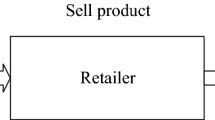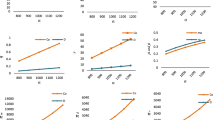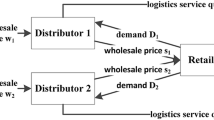Abstract
In many cases, end customers are sensitive to a product’s logistics service level which is provided by a third-party logistics (3PL) provider, therefore, the continuous improvement of the logistics service is imperative and valuable. However, the problem is that improving the logistics service benefits all of them, but is costly to only the 3PL provider. The 3PL provider is not willing to do this. Sharing the logistics cost is one solution to this problem. This study investigates cost sharing in two kinds of supply chains, i.e., one manufacturer-one 3PL provider-one retailer supply chain and two manufacturers-one 3PL provider-one retailer supply chain. Two types of cost sharing mechanisms, i.e., decentralized cost sharing mechanisms and centralized cost sharing mechanisms, are explored. Decentralized cost sharing mechanisms are proposed as contracts that chain members separately decide their cost sharing portions to optimize their own profits, ignoring the collective impacts of their decisions on the channel as a whole. Centralized cost sharing mechanisms are in the situation that chain members negotiate their cost sharing portions so that their profits are the shares of the entire supply chain’s profit, implying that the supply chain is coordinated perfectly. This study aims to analyse how cost sharing mechanisms affect supply chain performance and under what conditions chain members are willing to engage in cost sharing mechanisms. Conditions necessary for cost sharing mechanisms to achieve win-win outcomes are identified.




Similar content being viewed by others
References
Balireddi S, Uhan NA (2012) Cost-sharing mechanisms for scheduling under general demand settings. Eur J Oper Res 217:270–277
Choi SC (1991) Price competition in a channel structure with a common retailer. Mark Sci 10:271–296
Choi SC (1996) Price competition in a duopoly common retailer channel. J Retail 72:117–134
Corbett C, DeCroix GA (2001) Shared-saving contracts for indirect materials in supply chains: channel profits and environmental impacts. Manag Sci 47(7):881–893
Chao GH, Iravani SMR, Savaskan RC (2009) Quality Improvement Incentives and product recall cost sharing contracts. Manag Sci 55(7):1122–1138
Cachon GP, Lariviere MA (2005) Supply chain coordination with revenue -sharing contracts: strengths and limitations. Manag Sci 51(1):30–44
Cachon GP, Kök AG (2010) Competing manufacturers in a retail supply chain: on contractual form and coordination. Manag Sci 56(3):571–589
Cai XQ, Chen J, Xiao YB, Xu XL, Yu G (2013) Fresh-product supply chain management with logistics outsourcing. Omega 41(4):752–765
Ding D, Chen J (2008) Coordinating a three level supply chain with flexible return policies. Omega 36:865–876
Giannoccaro I, Pontrandolfo P (2004) Supply chain coordination by revenue sharing contracts. Int J Prod Econ 89(2):131–139
Hertz S, Alfredsson M (2003) Strategic development of third party logistics providers. Ind Mark Manag 32:139–149
Hsiao HI, Kemp RGM, van der Vorst JGAJ, Omta SWF (2010) A classification of logistic outsourcing levels and their impact on service performance: evidence from the food processing industry. Int J Prod Econ 124:75–86
He Y, Zhao X (2012) Coordination in multi-echelon supply chain under supply and demand uncertainty. Int J Prod Econ 139(1):106–115
Jaber MY, Bonney M, Guiffrida AL (2010) Coordinating a three-level supply chain with learning-based continuous improvement. Int J Prod Econ 127(1):27–38
Knemeyer AM, Corsi TM, Murphy PR (2003) Logistics outsourcing relationships: customer perspectives. J Bus Logist 24:77–109
Lee E, Staelin R (1997) Vertical strategic interaction: implications for channel pricing strategy. Mark Sci 16(3):185–207
Leng M, Parlar M (2010) Game-theoretic analyses of decentralized assembly supply chains: non-cooperative equilibria vs. coordination with cost-sharing contracts. Eur J Oper Res 204:96–104
Maltz A, Ellram LM (1997) Total cost of relationship: an analytical framework for the logistics outsourcing decision. J Bus Logist 18:45–66
Munson C, Rosenblatt M (2001) Coordinating a three-level supply chain with quantity discounts. IIE Trans 33(5):371–384
Pan K, Lai KK, Leung SCH, Xiao D (2010) Revenue-sharing versus wholesale price mechanisms under different channel power structures. Eur J Oper Res 203:532–538
Qin Y, Wang R, Vakharia AJ, Chen Y, Seref MMH (2011) The newsvendor problem: review and directions for future research. Eur J Oper Res 213:361–374
Razzaque MA, Sheng CC (1998) Outsourcing of logistics functions: a literature survey. Int J Phys Distrib Logist Manag 28:89–107
Sinha S, Sarmah SP (2010) Coordination and price competition in a duopoly common retailer supply chain. Comput Ind Eng 59:280–295
Seifert RW, Zequeira RI, Liao S (2012) A three-echelon supply chain with price-only contracts and sub-supply chain coordination. Int J Prod Econ 138:345–353
Trivedi M (1998) Distribution channels: an extension of exclusive retailership. Mark Sci 44(7):896–909
Wu D (2011) Joint pricing-servicing decision and channel strategies in the supply chain. Cent Eur J Oper Res 19:99–137
Yao Z, Leung SCH, Lai KK (2008) Manufacturer’s revenue-sharing contract and retail competition. Eur J Oper Res 186:637–651
Acknowledgments
The work described in this paper was supported by Natural Science Foundation of China under grant 71272085.
Author information
Authors and Affiliations
Corresponding author
Appendix
Appendix
Proof of Proposition 1
Because 2\(m_{R}\ge m_{L},4m_{M}\ge 2m_{R} + m_{L}\), we have
-
(i)
\( \begin{array}{ll} _{DCS}\Pi _{M}^{*} - \Pi _{M}^{*} &{}= \frac{\alpha ^{2}[(4m_M +2m_R +m_L )^{2}-32m_M m_L ]}{64k}\ge \frac{\alpha ^{2}[(4m_M +2m_L )^{2}-32m_M m_L ]}{64k}\\ &{}=\frac{\alpha ^{2}(2m_M -m_L )^{2}}{16k}\ge 0. \end{array}\)
-
(ii)
\(_{DCS}\Pi _L^*-\Pi _L^*=\frac{\alpha ^{2}m_L (4m_M +2m_R -3m_L )}{16k}\ge 0\).
-
(iii)
\( \begin{array}{ll} _{DCS}\Pi _R^*-\Pi _R^*&{}=\frac{\alpha ^{2}[4m_M (2m_R +m_L )+(2m_R +m_L )^{2}-16m_R m_L ]}{32k}\\ &{}\ge \frac{\alpha ^{2}[2(2m_R +m_L )^{2}-16m_R m_L ]}{32k}\\ &{}=\frac{\alpha ^{2}(2m_R -m_L )^{2}}{16k}\ge 0. \end{array}\)
Proof of Proposition 2
The proof is already in the text and therefore the detail is omitted.
Proof of Proposition 3
-
(i)
\(\begin{array}{l} _{CCS}\Pi _R^*-_{DCS}\Pi _R^*\\ \quad =\frac{\alpha ^{2}[8m_R (m_M +m_R +m_L )-(2m_R +m_L )(4m_M +2m_R +m_L )]}{32k}\\ \quad =\frac{\alpha ^{2}(4m_R^2 +4m_R m_L -4m_M m_L -m_L^2 )}{32k}. \end{array}\) If 4\(m_{R}^{2} + 4m_{R}m_{L} - 4m_{M}m_{L} - m_{L}^{2}\ge \) 0, then \(_{CCS}\Pi _{R}^{*}\ge _{DCS}\Pi _{R}^{*}\)
-
(ii)
\(\begin{array}{ll} _{CCS}\Pi _M^*-_{DCS}\Pi _M^*&{}=\frac{\alpha ^{2}[16m_M (m_M +m_R +m_L )-(4m_M +2m_R +m_L )^{2}]}{64k}\\ &{}=\frac{\alpha ^{2}[8m_M m_L -(2m_R +m_L )^{2}]}{64k}. \end{array}\) If \(8m_{M}m_{L} - (2m_{R} + m_{L})^{2}\ge \) 0, then \(_{CCS}\Pi _{M}^{*}\ge _{DCS}\Pi _{M}^{*}\).
-
(iii)
\(_{CCS}\Pi _L^*-_{DCS}\Pi _L^*=\frac{\alpha ^{2}m_L (2m_R +3m_L )}{16k}>0\).
Proof of Proposition 4
Because \(4\alpha m_M \ge (\alpha -\beta )(2m_R +m_L ),2m_R \ge m_L \), we have
-
(i)
\({{\begin{array}{ll} {}_{PCS,MM}\Pi _{M1}^*\!-\!{}_{MM}\Pi _{M1}^*&{}=\frac{16\alpha ^{2}m_M^2 \!+\!16\alpha (\alpha \!-\!\beta )m_M m_R -24\alpha (\alpha \!-\!\beta )m_M m_L +(\alpha -\beta )^{2}(2m_R +m_L )^{2}}{64k}.\\ &{}\ge \frac{16\alpha ^{2}m_M^2 -16\alpha (\alpha -\beta )m_M m_L +(\alpha -\beta )^{2}(2m_R +m_L )^{2}}{64k}\\ &{}\ge \frac{16\alpha ^{2}m_M^2 -16\alpha (\alpha -\beta )m_M m_L +4(\alpha -\beta )^{2}m_L ^{2}}{64k}\\ &{}=\frac{[4\alpha m_M -2(\alpha -\beta )m_L ]^{2}}{64k}\ge 0. \end{array}}}\)
-
(ii)
\(\begin{array}{ll} {}_{PCS,MM}\Pi _L^*-{}_{MM}\Pi _L^*&{}=\frac{(\alpha -\beta )m_L [4\alpha m_M +(\alpha -\beta )(2m_R +9m_L )-12(\alpha -\beta )m_{L}}{16k}\\ &{}\ge \frac{(\alpha -\beta )m_{L} [(\alpha -\beta )(2m_R +m_L )+(\alpha -\beta )(2m_R +9m_L )-12(\alpha -\beta )m_{L}}{16k}\\ &{}\ge \frac{(\alpha -\beta )m_L [2(\alpha -\beta )m_L +10(\alpha -\beta )m_L -12(\alpha -\beta )m_L ]}{16k}=0. \end{array}\)
-
(iii)
\(\begin{array}{ll} _{PCS,MM}\Pi _R^*-_{MM}\Pi _R^*&{}=\frac{(\alpha -\beta )m_R [4\alpha m_M +(\alpha -\beta )(2m_R -7m_L )]}{16k}\\ &{}\quad +\frac{(\alpha -\beta )m_L [4\alpha m_M +(\alpha -\beta )(2m_R +m_L )]}{32k}\\ &{}\ge \frac{(\alpha -\beta )m_L [8\alpha m_M +(\alpha -\beta )(4m_R -6m_L )]}{32k}\\ &{}\ge \frac{(\alpha -\beta )m_L [2(\alpha -\beta )(2m_R +m_L )+(\alpha -\beta )(4m_R -6m_L )]}{32k}\\ &{}=\frac{(\alpha -\beta )^{2}m_L (2m_R -m_L )}{8k}\ge 0. \end{array}\)
-
(iv)
\(\begin{array}{ll} _{PCS,MM}\Pi _{M2}^*-_{MM}\Pi _{M2}^*&{}=\frac{\beta m_M [3(\alpha -\beta )m_L -4\alpha m_M -2(\alpha -\beta )m_R ]}{8k}\\ &{}\le \frac{\beta m_M [3(\alpha -\beta )m_L -(\alpha -\beta )(2m_R +m_L )-2(\alpha -\beta )m_R ]}{8k}\\ &{}=\frac{\beta (\alpha -\beta )m_M (m_L -2m_R )}{4k}\le 0. \end{array}\)
Proof of Proposition 5
Because 4\(m_{M}\ge 2m_{R} + m_{L}, 2m_{R}\ge m_{L}\), we have
-
(i)
\({{\begin{array}{ll} _{BCS,MM}\Pi _{M1}^*-_{MM}\Pi _{M1}^*&{}=\frac{(\alpha -\beta )^{2}[(4m_M +2m_R +m_L )^{2}-32m_M m_L ]}{64k}\\ &{}\ge \frac{(\alpha -\beta )^{2}[(4m_M +2m_L )^{2}-32m_M m_L ]}{64k}\!=\!\frac{(\alpha -\beta )^{2}(2m_M -m_L )^{2}}{16k}\!\ge \! 0.\\ \end{array}}}\)
-
(ii)
\(_{BCS,MM}\Pi _L^*-_{MM}\Pi _L^*=\frac{(\alpha -\beta )^{2}m_L (4m_M +2m_R -3m_L )}{8k}\ge 0\).
-
(iii)
\(\begin{array}{ll} _{BCS,MM}\Pi _R^*-_{MM}\Pi _R^*&{}=\frac{(\alpha -\beta )^{2}[(4m_M +2m_R +m_L )(2m_R +m_L )-16m_R m_L ]}{16k}\\ &{}\ge \frac{(\alpha -\beta )^{2}[(2m_R +m_L )^{2}-8m_R m_L ]}{8k}=\frac{(\alpha -\beta )^{2}(2m_R -m_L )^{2}}{8k}\ge 0. \end{array}\)
Proof of Proposition 6
The proof is already in the text and therefore the detail is omitted.
Proof of Proposition 7
The proof is already in the text and therefore the detail is omitted.
Proof of Proposition 8
The proof is similar to that in Proposition 3 and therefore the detail is omitted.
Rights and permissions
About this article
Cite this article
Jiang, L., Wang, Y. & Liu, D. Logistics cost sharing in supply chains involving a third-party logistics provider. Cent Eur J Oper Res 24, 207–230 (2016). https://doi.org/10.1007/s10100-014-0348-5
Published:
Issue Date:
DOI: https://doi.org/10.1007/s10100-014-0348-5




